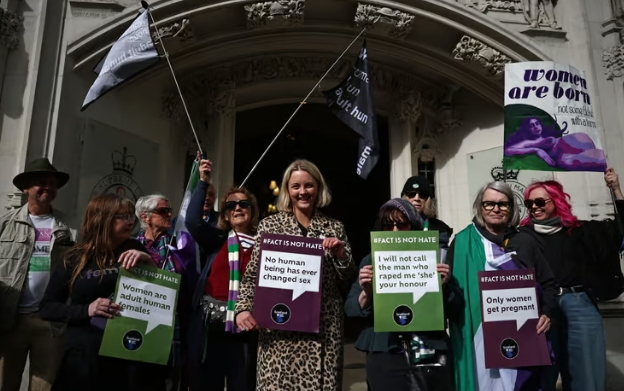The UK Supreme Court ruled that "woman" in equality law refers to a biologically female individual, not a transgender person with a Gender Recognition Certificate. This decision challenges a 2018 Scottish law that included transgender women in public board quotas, raising concerns about the impact on sex-based rights and protections for trans people.
UK Supreme Court: 'Woman' means biological female under law


The UK Supreme Court ruled on Wednesday that, under the country's equality laws, the term "woman" refers to an individual who is biologically female. Justice Patrick Hodge, speaking on behalf of the court, clarified that the terms "woman" and "sex" in the Equality Act are understood to denote a biological woman.
This judgment was reached unanimously by five Supreme Court judges. According to the ruling, a transgender person with a Gender Recognition Certificate (GRC) who identifies as female is not legally recognized as a woman under UK equality law.
The case stems from a 2018 law passed by the Scottish Parliament that mandated 50% female representation on public boards. This law initially included transgender women within its definition of women.
However, the Supreme Court's ruling emphasizes that this judgment does not remove protection for transgender individuals. They are still safeguarded from discrimination based on gender reassignment, as stated by the UK’s top court.
The case was initiated by a women's rights organization, For Women Scotland (FWS), which challenged the 2018 Scottish law. The group contended that the redefinition of "woman" extended beyond the powers of Parliament. In response, Scottish authorities issued new guidelines stating that individuals holding a Gender Recognition Certificate (GRC) would be included in the definition of a woman.
The FWS argued that this redefinition could have far-reaching consequences for sex-based rights and access to single-sex spaces, such as toilets, hospital wards, and prisons, not only in Scotland but also across England and Wales.
Trina Budge, director of FWS, expressed concerns that not linking the definition of "sex" to its biological meaning could allow public boards to legally meet female representation quotas by having 50% men and 50% individuals holding GRCs, even if the latter were biologically male.
Such a shift could potentially enable boards to meet female quotas with entirely male memberships, as long as some members possessed GRCs.
In 2022, the Scottish court rejected the challenge, but FWS was granted permission to appeal the decision to the Supreme Court in 2024.
Amnesty International filed a court brief in response to the ruling, expressing concerns about the declining rights of transgender people both in the UK and globally. Amnesty argued that removing sex-based discrimination protections for transgender individuals infringes on human rights laws.
The organization further stated that a blanket policy excluding trans women from single-sex services is an imbalanced approach and fails to achieve a legitimate aim. This perspective was shared with the court in their submission.

 বাংলা
বাংলা  Spanish
Spanish  Arabic
Arabic  French
French  Chinese
Chinese 
